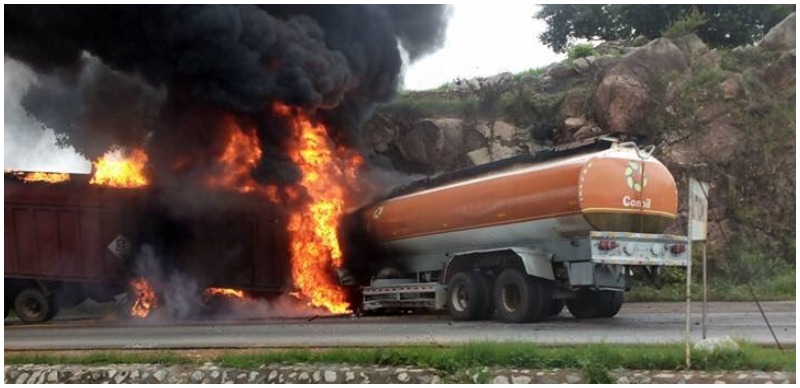The Federal Fire Service (FFS) in Gombe State has issued a stern warning to residents against the perilous practice of scooping fuel from tanker accident sites, a hazardous activity that has become a recurrent concern due to a recent spate of tanker crashes in the state. The FFS has responded to three separate tanker-related incidents within the first nine days of September alone, underscoring the urgency of addressing this dangerous behavior. These incidents, occurring along major roadways in Gombe, highlight the potential for catastrophic consequences if swift and effective intervention isn’t implemented. The FFS emphasizes that the rapid response of their personnel has been instrumental in averting major disasters, particularly in the most recent incident on the Gombe-Kano Road, where a timely response prevented what could have been a national tragedy.
The act of scooping fuel, as the FFS emphatically warns, poses a severe threat to life and property. The flammable nature of petroleum products combined with the often chaotic nature of accident scenes creates a volatile environment ripe for disaster. The potential for explosions and fires, capable of inflicting widespread damage and casualties, is a stark reality that necessitates immediate action to deter this risky behavior. The FFS underscores the importance of allowing trained professionals to manage these incidents, urging the public to prioritize safety by staying clear of accident scenes and allowing emergency responders to perform their duties without interference. This proactive approach, combined with community-wide awareness, is crucial to mitigating the risks associated with fuel tanker accidents.
Beyond the immediate danger to life, the practice of fuel scooping also carries long-term implications for the environment and the overall safety of communities. Spilled fuel can contaminate soil and water sources, posing a significant environmental hazard with potentially devastating long-term consequences. The FFS, therefore, emphasizes that the responsibility for preventing such incidents rests not only with the fire service but also with every citizen. Building a fire-resilient society requires a collective commitment to responsible behavior and a conscious effort to avoid risky practices that endanger individuals, communities, and the environment. This shared responsibility is pivotal to fostering a culture of safety and preventing future tragedies.
The Nigerian government, through the Nigerian Midstream and Downstream Petroleum Regulatory Authority (NMDPRA), is actively considering measures to address the recurring problem of tanker accidents. One proposed measure involves restricting the capacity of tankers operating on federal highways to 45,000 liters, effectively banning tankers with a 60,000-liter capacity. This proposal comes in response to the alarming number of fatalities resulting from petrol tanker accidents, with 493 deaths recorded in just three years. The NMDPRA’s proactive approach reflects a commitment to reducing the risks associated with tanker transportation and improving overall road safety.
The government’s consideration of a tanker capacity restriction is a significant step towards achieving its goal of zero fatalities from petroleum tanker accidents. By limiting the volume of fuel transported in each tanker, the potential impact of an accident is significantly reduced. This measure, combined with ongoing efforts to improve road infrastructure, enforce safety regulations, and educate drivers, represents a comprehensive approach to addressing the complex issue of tanker safety. The ultimate aim is to create a safer transportation system that minimizes the risk of accidents and protects both lives and the environment.
This multi-faceted approach, encompassing public awareness campaigns, stricter regulations, and enhanced safety measures, is essential to tackling the root causes of tanker accidents and fostering a culture of responsible behavior. The ongoing efforts to educate the public about the dangers of fuel scooping, coupled with the government’s proactive stance on tanker safety, are crucial steps towards building a safer and more resilient society. The combined efforts of government agencies, emergency responders, and the public are vital to preventing future tragedies and ensuring the safety of communities across the nation. By working together, a future free from the devastating consequences of tanker accidents can be realized.














